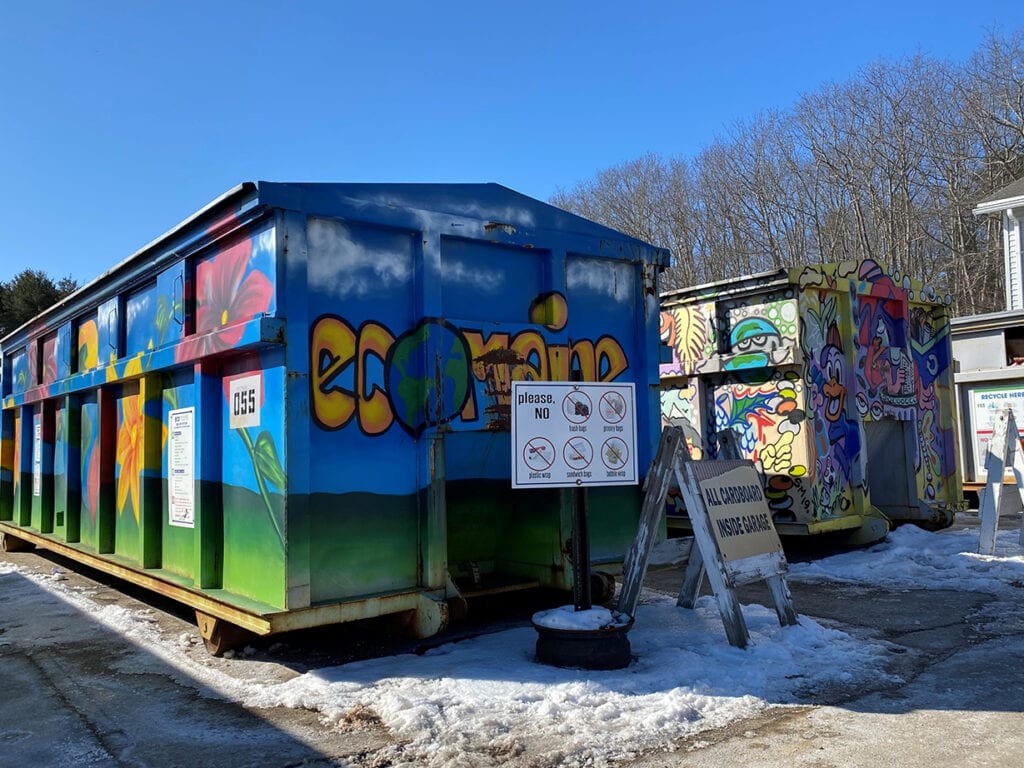Are you recycling right? Chances are, not always.
If someone asked you today, how confident do you feel that you are recycling correctly? If a recycling expert were to take a look inside your blue bin, would you be nervous? If you’re uncertain about the items you’ve been placing out at the curb, rest assured, you’re not alone! Through no fault of our own, we all get it wrong sometimes.
Despite all of the technological solutions we’ve created to solve the toughest environmental challenges, even in 2021, we are faced with a literal overflowing ocean of waste that cannot be sustainably managed through existing recycling systems. This is why Mainers needs to join the Natural Resources Council of Maine and take the lead on Recycling Reform by supporting LD 1541 on May 10, 2021.
Why Maine Needs Recycling Reform
There is very little regulation in place for labeling, causing confusion around what is actually recyclable and what is just greenwashing
Packaging manufacturers are not required to check with a wide variety of recycling facilities in order to brand their products as “recyclable.” And, bare-bones labeling does not provide enough instruction to consumers to help them determine whether or not an item should be recycled through a materials recovery facility (otherwise known as a MRF, pronounced “murph”), retailer collection program, or other recovery process like TerraCycle. For plastics in particular, those chasing arrows are simply not enough to convey if an item is readily recyclable or not. Take polystyrene foam, for example. The foam, known for its light and fluffy qualities, can only be recycled after being processed in very specific conditions, and facilities set up for processing foam plastics are few and far between — for us Mainers, the nearest plant is hundreds of miles away (which is why polystyrene foam bans are so popular).
Access to comprehensive recycling services is not equitable across the state
Due to the rising costs of processing recyclables, this municipal service, which was once very affordable, can sometimes be more costly than landfilling now, particularly in more rural areas of the state. It is estimated that $16 – 17.5 million is spent annually on disposal of product packaging in Maine. The added costs to municipalities of collecting, hauling, processing, and managing contamination of recycling separately from waste means that more tax money gets spent managing packaging waste designed by producers, rather than using that funding to support other types of essential services like schools and infrastructure. In some instances, the costs of recycling force towns to reconsider providing recycling services altogether, dooming hundreds of tons of quality material to a lifetime in Maine’s landfills. Meanwhile, the producers who create that packaging are not obligated to help shoulder the burden or redesign their packaging to make it easier to recycle and help communities reduce those costs.
Different recycling facilities have different equipment and rules
Because of the competitive, market-driven nature of recycling systems, local MRFs are limited in what they are able to accept by the manufacturers who purchase the recycling to make new goods. If a manufacturer has no use for a certain type of material, a local MRF may not be able to accept that material from consumers. This also adds further confusion when packaging changes; if a producer changes their packaging to use a different type of plastic or redesigns the container and the packaging is no longer recyclable, it adds more pressure on consumers to figure out the right way to recycle or dispose of this new kind of waste, again with the costs being borne by consumers.
Recycling is only a part of the solution to our waste problem
Extended-Producer Responsibility (EPR) is an important step in a long battle against overflowing waste in landfills, ocean pollution, and depletion of our natural resources. Remember that recycling comes third in the 3Rs for a reason, and we can’t simply recycle the problem away. We need to work together with our communities, businesses, and neighbors to eliminate waste at the source, and then, with the help of Recycling Reform, we can lean on stronger recycling systems to help us preserve resources for generations to come.

So…What can individuals do to help?
Call your local representatives and town council members today
Not only can your district representatives in Augusta support LD 1541 this session, but your town councils can also support efforts to improve recycling in Maine. Ask your town council to sign the municipal resolution supporting LD 1541, and encourage them to submit testimony on behalf of your community. You can also ask them to consider bans on single-use plastics that are not recyclable (straws, utensils, bags, etc.) and encourage them to support education and funding for your municipal recycling program.
Vote with your dollars (if and when you can)
While not everyone has the ability to shop zero waste, there are still many ways that Mainers can help support a circular economy. Whenever possible, opt for recyclable packaging over disposables, especially when it comes to plastic packaging that would otherwise sit forever in a landfill.
Get involved!
Sign NRCM’s petition to show your support, and encourage your friends and family to do the same! Visit recyclingreform.org for more information, including how to submit testimony in support of LD 1541.
—by Vanessa Berry, NRCM Rising Leadership Team member










Convincing manufacturers to use only recyclable packaging, and not combing different types of packaging on one product, as well as eliminating waste in packaging is extremely important!